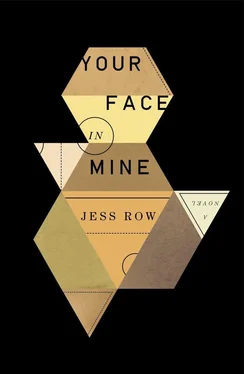Did you talk to him?
No! I mean, that’s what makes it so strange. I rolled down the window and called out to him, and he didn’t even look my way. Then, I mean, I pulled over, and got out of the car, and yelled, Martin! Hey, Martin! And he turned around, stared at me, I mean, obviously recognizing who I was, and then walked away. No smile. No wave. I was stunned. But then — I mean, I was busy. I was stressed. I just put it out of my mind. At the time I was sure it was him. And I was sure he knew it was me. But later, you know, I started to wonder. I mean, who the fuck would do that? I never did anything to hurt him. Maybe he became an assassin or something. He looked like he might be going to kill somebody. But whatever it was, it was permanent. I feel sure of that. Whatever it was, we’ll never know.
You’re sure it was 1999? And he looked exactly the same? I mean, his face, his skin, everything?
Why would you ask that?
No reason, I say, trying to keep my face blank. Just looking for all the available information.
Of course I remember you, Steve Cox says, over a stormy cell-phone connection, filled with flurries and zings of static. You know what I remember? Your face. You have a very open face. Or at least you did. Very — I don’t know. Vulnerable. Not rigid. What’s a word for not rigid? Flexible? No. Soft? Permeable. Not the kind of person an attorney gets to meet very often. I could tell instantly that you didn’t deserve to be wrapped up in — well, what you were wrapped up in. And anyway, the details were pretty memorable, Kelsey. I see a lot of hinky stuff in here, but even by those standards. Say, did you ever think about that Costa Rica deal I told you about?
It’s Kelly.
Sorry. I’m terrible with Christian names. Guess it comes from a lifetime of X v. Y. Kelly Thorndike , I have that right? How’s your wife?
I’m having this conversation in the entryway of my apartment, cradling the phone against my shoulder.
Long story, I say. She’s not in the picture.
My condolences. Personal and professional.
I’m actually calling about something unrelated, I say, a completely different subject. I need someone to do a private investigation. A background check.
Employment? School?
Employment, I guess you could say. Loosely speaking.
The more you tell me, the more I can help you.
Okay, I say. Actually, cancel that. Call it a missing person instead.
Silence.
You still there? Steve?
I’m waiting.
It’s an odd situation, I’ll grant you that.
Life is full of nothing but. Listen, Kelly, you’ve got my full attention. Pen poised and ready. Pad on my desk.
The name’s Martin Lipkin, I say, with a slight hiccup, a juttering of the chin. He was a high school classmate of mine. Willow School, Brooklandville, Maryland, class of ’93. Last known address somewhere near Greenmount Avenue in Baltimore.
Last time you saw him?
Nineteen ninety-four. February. In Towson. That’s a suburb.
I know where Towson is. Any sense of his plans at that time? I mean, you used the phone book, right? I’m not going to do one PR search and get his number?
No trace. I’ve looked everywhere I can think of. And no one I know from Willow has seen him, either. Not in fifteen years.
Anything else?
I can get his yearbook picture. I’ll send it to you. And, oh, yeah, there’s a very small chance — just the smallest possible chance — he might be using a different name. Martin Wilkinson. His mom’s last name. You could search for both. It’s a shot in the dark, but there it is.
So let me ask you one last question. What’s your instinct? You think he might have moved to California? Alaska? Is he playing in a band somewhere? Doing porn? Selling drugs? He in prison? Selling real estate? Or just, you know, a bad correspondent? You think I’ll find him with a wife and two kids out in Hunt Valley, just trying not to be noticed?
He was slippery, I say. Always kind of a mystery. Kind of fascinated by disguises. I think he could have made a really concerted effort to hide his tracks. Not even necessarily for any good reason.
You know what my retainer is, in that case?
I’ll pay it.
Then you must have had a good divorce lawyer. Better than mine, anyway. Listen, I’m telling you, if you ever have a moment. Costa Rica. There’s still parcels left. The country doesn’t even have an army.
It’s my turn to be silent, as he rattles on, his voice weaving in and out, packets of data colliding and falling apart.
Was he another depressed case, like your other friend, maybe? Be honest. Makes my life easier and saves you money. Could he be dead, you think? Homeless shelter? Halfway house? Because in that case you could spend everything and get nothing. You know how hard it is to get dental records on paupers’ graves? DNA on a John Doe?
He’s alive, I say. Definitely alive. Though that doesn’t mean you’ll find him.
Recording #3 (34:56)
Source: Sony cassette tape, 90 minutes, condition +
Labeled side one “Tape 3 PRIVATE DO NOT DESTROY”
When did I first know I was white? Not at Shabazz. No, sir. Of course I knew I was the color white. I knew I wasn’t black. I knew I wasn’t Mexican or Korean or Puerto Rican. But when did I know I was white, as a thing in itself, as something to be? At Roland Park. At Willow. At Roland Park, at Willow, where there were other white people.
The funny thing is, it was all a little artificial at first. I had to be told. When I arrived at RP, I spoke, effectively, black English. Not consciously. Not at home. But I had a school vocabulary; I addressed the teachers as they expected to be addressed. Where Darnell at? He on the jungle gym, Miz Dixon. It’s just idiom, after all. Any child can pick it up. And at Shabazz no one thought it was funny; no one thought I was funny. Sad, maybe, a little, but not funny. But at Roland Park the teachers were in a panic. The second or third day — I’ll never forget this — they had a meeting with me, my teacher, the principal, Dad, of course, and a speech pathologist. Martin, Mrs. Richards said — that was my teacher — it’s not wrong to speak that way if you want, it’s not hurting anybody, but there’s such a thing as standard English, and that’s what we speak at this school. We don’t want you to be uncomfortable here.
I’m not uncomfortable, I said.
And we don’t want you to make anyone else uncomfortable. Without meaning to. Ashante, for example. You like Ashante, right? Didn’t she share her cupcake with you at lunch? You don’t want her to think you’re making fun of her. That’s when I started to cry.
What was I supposed to think? And Dad, I looked over at Dad, and he was just kind of puzzled and amused. Don’t worry, he said. You want your little chameleon to change colors. He’ll change soon enough. They didn’t think that was funny. But you know who really took offense, after all that fuss? Malik Williams. Remember him? His son was in my class. The Sun columnist, the first black columnist they hired, though he lasted all of five minutes. He was an old-school firebrand, an Al Sharpton wannabe, with a big head of dreadlocks and a beard. Scary Rasta style, though he was local — West Side through and through. He was fired in a plagiarism scandal, accused of stealing copy from some other columnist in Atlanta. Of course he sued, and lost. Major news in Baltimore in the mid-Eighties.
In any case, his son, Stokely, came home and told him that there was a white kid at Roland Park trying to talk like a brother, and he just hit the roof. Demanded a meeting with the principal, wanted to meet with Dad, too. He called it cross-racial experimentation. Wrote a column about it, too. What kind of perverse linguistic experiment is going on at Roland Park Elementary School? Why are they teaching white children to speak pidgin Black English? And Stokely — God, he was such a nice kid — he was really caught in the middle. He even said to me, Dad told me I should give you a beat-down. He was the tiniest kid in the class. Couldn’t have beat me in arm wrestling.
Читать дальше












